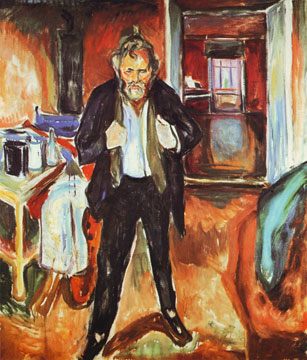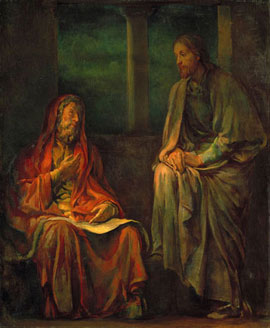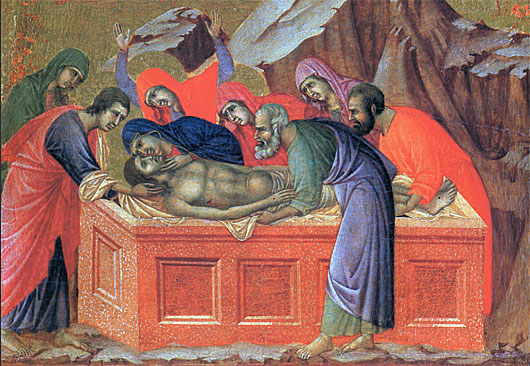
Reflection by Deborah Beach Giordano
At Night
Why did Nicodemus come to Jesus at night? It has been suggested that the Pharisee wanted to keep their meeting a secret because he was embarrassed to be consulting Jesus, or that he wanted to challenge the Lord’s status as a Teacher — thus his use of the term “Rabbi” was intended sarcastically — but didn’t want to risk a possible public trouncing. It might also have been that he was afraid to be seen consorting with a known rabble-rouser.
But think about it.
It is the middle of the night: the hours of darkness, of doubt, of distress; the time when we lie awake, tossing and turning, worrying and wondering. Nicodemus comes to talk to the Lord when many of us have — and probably for the same reasons. He’s feeling alone and lonely, disturbed, uncertain… and there’s nobody to talk to, no one who will understand, no one he can speak to truthfully, no one to whom he can openly and honestly share his fears and his feelings.

Nicodemus calls on Jesus during the dark night — of his soul. Questioning, concerned, sleepless, stressed, anxious: Why are we here, what happens next, what’s that weird twinge in my back; will I lose my job; where is my kid at this hour and who else is there; the cat has been acting strangely; is the world about to end; I think I’m getting sick; is that a leak under the sink; my grandmother doesn’t look well….. There are so many problems, so few answers and I’m so tired; I don’t know how much longer I can hold on. Oh Christ Jesus, for the love of God, help me!
We’ve all been there, in the cold and lonely dark night of the soul: scared, hurting, hopeless, at the end of our tether. Some of us may be there right now.
Job 2.0?
 The experience of fear and dread drives us to prayer and pleading with God — even if we tell ourselves we no longer believe. We still cry out, we go in search of Someone Who Will Hear — even if only to curse and condemn, to challenge and accuse as Job did. And that is who I believe Nicodemus most resembles: Job, the plaintiff who demands a fair hearing, the fellow who insists that God defend Godself against charges of wrongful conduct, of handling the task of running the world inadequately and unfairly.
The experience of fear and dread drives us to prayer and pleading with God — even if we tell ourselves we no longer believe. We still cry out, we go in search of Someone Who Will Hear — even if only to curse and condemn, to challenge and accuse as Job did. And that is who I believe Nicodemus most resembles: Job, the plaintiff who demands a fair hearing, the fellow who insists that God defend Godself against charges of wrongful conduct, of handling the task of running the world inadequately and unfairly.
Nicodemus comes to Jesus with challenges and doubts. From the first he pretends to misunderstand, and then mocks the Lord’s words: “What do you mean ‘born again’?” A religious leader himself, he certainly knew the meaning of renewal “by water and Spirit;” baptism and other rituals of restoration and spiritual cleansing were commonplace. I see him sitting across from Jesus with his arms folded across his chest, “Convince me.”
Did Nicodemus come to evaluate what Jesus would say, to check whether the Lord’s theology was “correct”? Or were his words born out of his own need for reassurance? Perhaps he had grown frustrated, jaded, tired, hopeless; perhaps these religious expressions had become mere words: sacred terminology devoid of real meaning, hollow gestures with no transforming power. Perhaps the healing pool of Bethesda was simply water, perhaps “Spirit” was no more than a breeze, just a lot of hot air.
Like nearly all of us at one time or another, Nicodemus came to Jesus seeking answers, perhaps questioning his faith, uncertain of his calling. Maybe “religion” itself seemed pointless; faith alone had not prevented the Roman occupation, being God’s chosen people hadn’t improved the Jews’ lot, prayers appeared to go unanswered, loved ones died while evil thrived, many more plows were turned into swords than the reverse.
As Job demanded, we, too ask: is God good, just, and fair — or deserving of criminal prosecution? Does God listen, does God hear, does God care, or are we doomed to lives of meaningless suffering and despair?
Jesus for the Defense
 In the midst of Nicodemus’ dark night, Jesus was there. Advocate and ally, the Lord hears and responds to our lonely Pharisee when no one else was available, when it seemed as if he was alone in the world, speaking words of assurance.
In the midst of Nicodemus’ dark night, Jesus was there. Advocate and ally, the Lord hears and responds to our lonely Pharisee when no one else was available, when it seemed as if he was alone in the world, speaking words of assurance.
Very much in keeping with Nicodemus as prosecuting council — as Job 2.0, demanding answers from God — the Gospel sounds like a transcript from the Divine Court: Jesus for the defense. Legal terms as “testify” and “witness,” occur repeatedly, concluding with the writer’s own testimony:
Truly, God did not send the Son into the world to condemn the world, but in order that the world might be saved through him.
It turns out that there was a trial, and a judgment rendered, but the roles were somewhat different from what we have conjectured: God was both Judge and Jury — and the Divine Decision was on the side of mercy. We are not destined for condemnation, but for salvation. God is not a harsh and punishing judge, but a tender and compassionate friend.
Mere Words?
The encounter between Nicodemus and Jesus appears to end without any further conversation. There is no high drama; Jesus offers no thought-provoking parable nor perform a miracle to prove His authority, he only listens and responds to Nicodemus’ words.
Yet perhaps there was a miracle that night: a giving of sight to the blind. It seems that, in meeting the Lord, Nicodemus’ eyes were opened; he received new wisdom and increased understanding. No longer stumbling in the darkness of confusion, his faith became knowledge: not belief, but certainty. Convinced of God’s grace and goodness, he becomes a creature of light.
We know of this miraculous transformation because Nicodemus makes a return appearance much later in John’s Gospel.
Nicodemus, who had at first come to Jesus by night, came now in daylight, bringing a mixture of myrrh and aloes. [He and Joseph of Arimathea] took the body of Jesus and, following the burial custom of the Jews, wrapped it with the spices in linen cloths. There was a garden near the place where he was crucified, and in the garden there was a newly-carved tomb. And so, because it was the Jewish day of Preparation, and the tomb was nearby, they laid Jesus there.
~ John 19:39–42

The Pharisee who once slipped through the shadows now publicly discloses himself to be a friend of Jesus. It is a risky revelation, for that Man has just been condemned and executed as a threat to society and now Nicodemus, too, will be viewed with distrust and suspicion. But somehow all fear had vanished, the threat of death held no power; drawn — again — to the Light, Nicodemus, a most unlikely gardener, plants the seed from which the Lord Christ will be born anew.
May the grace of the Lord Christ be born anew in us each day,
Deborah ✟
Suggested Spiritual Exercises
In your times of darkness, envision the Lord Christ as present and listening to you.
How do you plant the seeds of Christ-like grace in the world around you?